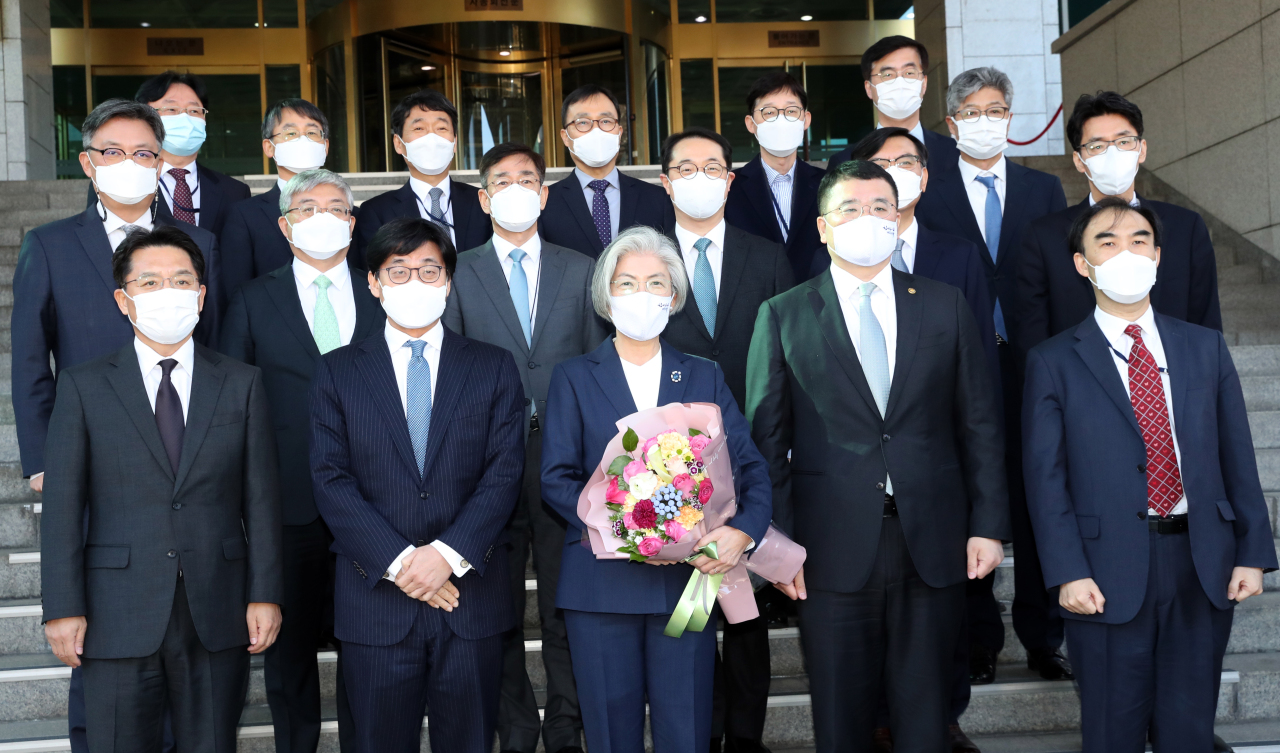 |
Outgoing Foreign Minister Kang Kyung-wha (C in front row) and other senior diplomats pose for a photo before leaving office at the foreign ministry in Seoul on Monday. (Yonhap) |
Foreign Minister Kang Kyung-wha left office Monday after nearly four years at the helm of South Korea's diplomacy grappling with a host of daunting challenges ranging from North Korea's nuclear quandary to historical spats with Japan and an escalating Sino-USrivalry.
Having led the ministry since June 2017, Kang described her stint as the nation's first female foreign minister as "most honorable" in her work life and voiced hope that her successor, Chung Eui-yong, will reinvigorate the ministry going forward.
"Of all workplaces I have gone through over more than 60 years, I think of this as the most honorable, and I think this will be remembered really as the most rewarding period in my life," she said during a farewell meeting with reporters.
"I leave office, but the foreign ministry will be here to stay forever. And I anticipate the new foreign minister, who played a key role in the Korean peace process and got recharged after a short break, will actively lead the ministry," she added.
In her farewell speech, Kang also described Chung as "best suited" to head the ministry at a "critical period for our diplomacy and inter-Korean relations."
"I hope that under the new leadership, the policies we have been pushing for will yield great progress, and the ministry will continue to move forward," she said.
Kang also exhibited a sense of relief, pointing to Iran's recent decision to free most of the 20 sailors of a South Korean oil tanker that Iran seized last month over environmental pollution allegations.
"I extend my special thanks to our vice foreign minister, director general and other diplomatic staff, as I feel relieved that the issue surrounding the vessel was addressed just before I leave office," she told reporters.
Kang's term as the nation's top diplomat has been marked by a raft of tough foreign policy tasks.
Among them were peace efforts with the North that have been stalled since the summit between former US President Donald Trump and North Korean leader Kim Jong-un in Hanoi in February 2019 collapsed without a deal due to differences over the scope and sequencing of Pyongyang's denuclearization and Washington's sanctions relief.
The continued deterioration of relations with Japan was another major headache for Kang, as historical tensions have spilled over into the security and economic realms with no diplomatic off-ramp in sight.
Escalating geopolitical tensions between the US and China over trade, technological leadership and security also posed a tricky foreign policy task, as Seoul seeks to maintain both the security alliance with Washington and the strategic partnership with Beijing.
Years of tiring work at the forefront of diplomacy appear to have made her seek a respite.
"I have no plans," she said, flashing a smile in response to a reporter's question of what she plans to do outside the ministry. (Yonhap)





![[Exclusive] Hyundai Mobis eyes closer ties with BYD](http://res.heraldm.com/phpwas/restmb_idxmake.php?idx=644&simg=/content/image/2024/11/25/20241125050044_0.jpg)
![[Herald Review] 'Gangnam B-Side' combines social realism with masterful suspense, performance](http://res.heraldm.com/phpwas/restmb_idxmake.php?idx=644&simg=/content/image/2024/11/25/20241125050072_0.jpg)

